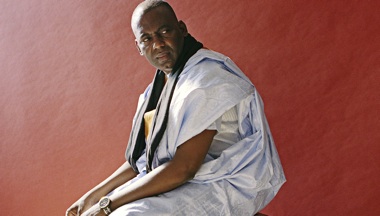Biram Ould Dah Ould Abeid
Mauritania is one of the few countries in the world where forms of slavery still exist today that look exactly as they did a hundred years ago.
In this West African nation, enslaved men and children typically herd camels, cows, and goats, or are forced to work in the field.
Enslaved women perform domestic chores, such as fetching water, gathering firewood, preparing food and caring for their master’s children. These men and women have no freedom to own land, to claim dowries from their own marriages, nor inherit property or possessions from their families.
In this context, it is nothing short of extraordinary that a Mauritanian court recently sentenced three prominent anti-slavery activists to two years imprisonment.
Brahim Bilal, Djiby Sow and Biram Ould Dah Ould Abeid, a former presidential candidate, were convicted of membership of an unrecognized organization and of taking part in an unauthorized assembly. According to independent reports, the men were arrested on 11 November 2014 during a peaceful campaign against slavery.
These men had much to campaign about.
Mauritania has the highest prevalence of modern slavery in the world. The Global Slavery Index reports an estimated four percent of the population are enslaved.
What is being done about this tragedy? Like many countries, the Government of Mauritania has taken steps – at least on paper – to respond to slavery.
For years, there have been laws that make slavery a crime. In 2013, the President established a National Agency to Fight against the Vestiges of Slavery, Integration, and Fight against Poverty (Tadamoun), and a national plan of action was made, with a $3.3 million budget.
In 2014, a special Tribunal to prosecute crimes of slavery was established.
While this may be progress, progress is ultimately measured in results. So how is Mauritania’s track record?
To date, Mauritania has convicted and imprisoned only one person, in 2011, for the actual crime of slavery itself. They received a sentence of 6 months imprisonment –compare this to the 2 year sentences just handed out to the anti-slavery activists.
The new Tribunal to prosecute slavery cases has not prosecuted any cases. Local sources suggest there is no evidence that such a Tribunal exists.
The Government of Mauritania must act urgently to address this shameful situation.
As of today, Mauritania holds the dubious distinction of having locked up more anti-slavery activists than it has ever convicted slaveholders. The Government of Mauritania must shift focus, and focus on the real criminals – those who perpetrate slavery, not those who seek its abolition.
The Government must publicly report on the work of Tadamoun, its National Agency to Fight Slavery, and the work of its special anti-slavery Tribunal.
They must also ensure a fair and open appeal process for the anti-slavery activists who are currently languishing in jail in Mauritania.
Call on Mauritania’s President Mohamed Ould Abdel Aziz to set Biram and his fellow anti-slavery activists free
http://www.walkfree.org/mauritania/
Michael Hayworth is a senior campaigner with Walkfree: the movement to end modern slavery working to eradicate exploitation of domestic workers and those trapped in forced labour. If you have a question for Michael tweet him: @michaelhayworth








